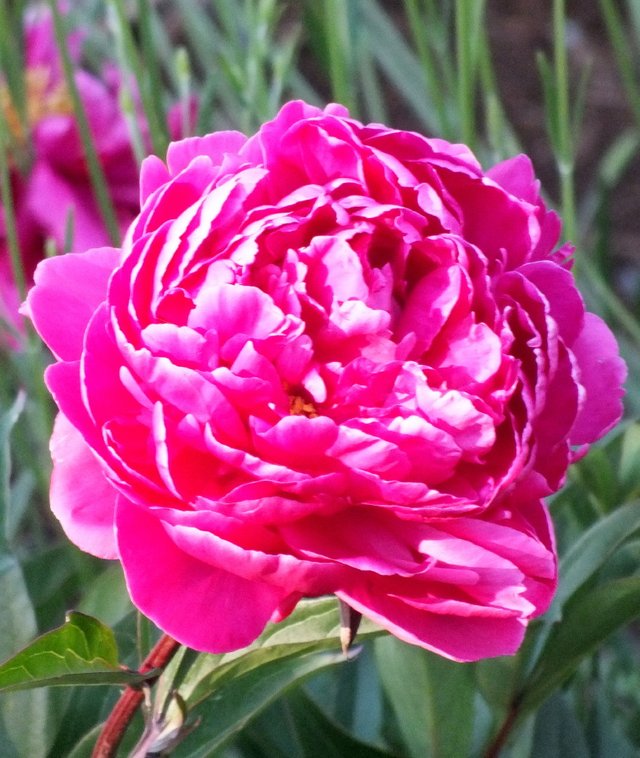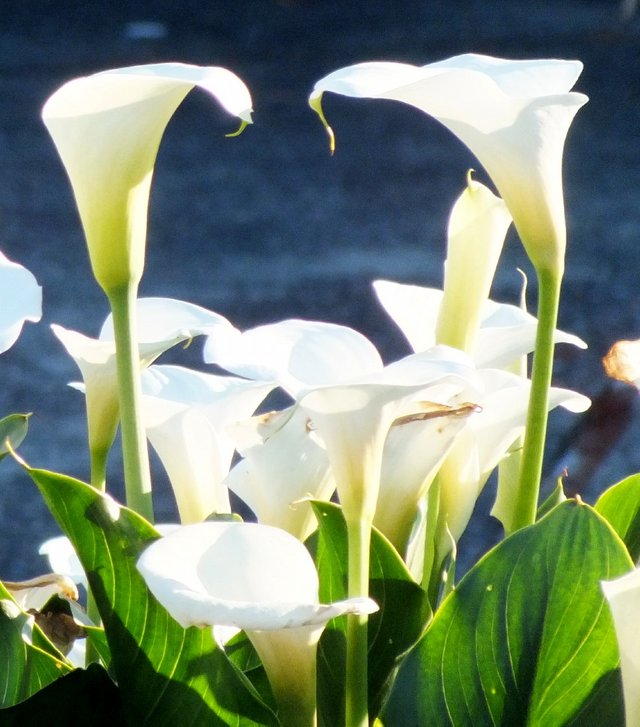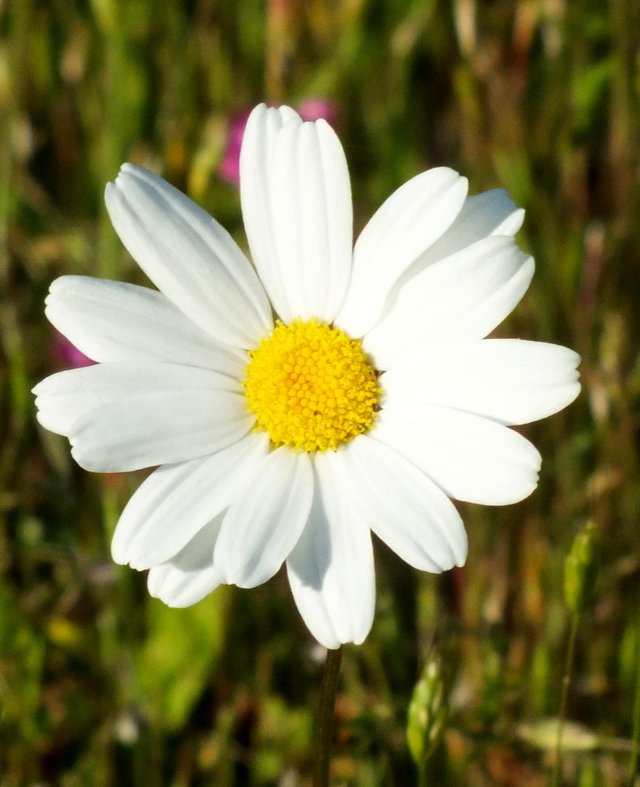When you feel like you're at a lost for how to get "unstuck" from a bad case of the blahs, perhaps the single most important thing to remember about creating written content is that writers write.
Whereas that might seem incredibly obvious, it's a fundamental truism that's often overlooked even by seasoned writers when they come face to face with a slump in creativity- or even the dreaded "Writer's Block."
A brief look at the underlying issues

A bright magenta peony
There are a number of reasons why writing creativity seems to dry up. Most of the time, however, the mere fact that our writing and creativity stagnates doesn't mean that we are actually "out of words."
Often the real reason we feel stuck has to do with a (usually false) impression that we can't think of anything good or "inspired" to write. And we remain stuck because we are waiting for something "significant" to come into our minds. Sometimes our stuckness has to do with feeling distracted by other things in our lives; things completely unrelated to writing.
Creativity — in writing, and in other fields — is a very unstructured process. It doesn't happen "on demand." Sometimes we get stuck because because we are facing a writing assignment that's very limiting and narrowly defined, and our creative spark is actually at odds with the task we are facing.
Unstructured writing as a path to getting unstuck
In the course of an almost 40-year career of writing, I've found that the single most effective way to get the words to flow again is to simply "write." Get away from prompts, topics and assignments! And get away from any ideas that you're writing for publication-- even for your informal blog.

Lilies in the sun
The following exercise is loosely adapted from creativity expert Julia Cameron's popular "Artist's Way" book and workshop series, in which she suggests journaling every morning before you do anything else. This exercise is different, in that it can be started at any time. You might think of it as a "brain flush," although it doesn't have an official name.
Just sit down at your keyboard (or with pen and ink, if your preference is to write longhand) and start writing. That is, just commit words to keyboard or paper. They don't have to make sense in any way — complete nonsense is OK. In fact, your exercise might start off looking something like this:
This is really stupid. I am wasting my time. I am so stuck. Stuck, stuck, stuck, stuckety-stuck. Cows eat green grass. I must remember to buy ketchup. This guy doesn't know what he is talking about. I bet he isn't even a writer. I bet he can't write his way out of a paper bag. And now I am doing this dumb thing. Dumb, dumb, dumb, dumb. I hate looking dumb. Toes are really dumb looking. Have you ever noticed that? I wonder who invented shoes... cavemen? So Easy, A Caveman Could Do It... those were funny ads. I wonder if they increased sales? I wonder if iconic ads even work?
Next thing you know, your mind is off exploring the history of footwear, or the way TV commercials can become cultural icons, or stone age clan structures, or something else. The only "rules" of this exercise are that you must agree to keep going for three pages. Most of the time, people discover that they rarely even get to the second page before they are writing something that's (at least) semi-interesting.

Pink petunia...
Why the Brain Flush exercise works
As I mentioned before, creativity and writing creatively seldom happen "on command." Sudden insight and inspiration generally do not suddenly arrive out of empty space while staring at a blank screen or page; they are typically triggered by something external, often an unrelated (and sometimes quite silly) thing we were thinking about, or even distracted by.
Consider this: How often have you sat in traffic and gotten a great idea for an article or blog post, and wished you were in front of your computer?
This happens because your thought patterns are "unforced" in that moment, and your idea is triggered by a funny billboard, a bumper sticker, or a woman wheeling a Dalmatian puppy around in a stroller. They are not triggered by a blank screen.
The exercise works quite well regardless of whether your writing tends to be fiction, or non-fiction. Fiction writers may find it helpful (which can also assist with character development) to turn this writing exercise into an actual pretend dialogue between yourself and one of your characters. Not only can you often "learn" something about that character (are they sympathetic, impatient, indifferent, to your predicament?), but you also get to practice writing dialogue.

Deep red-lilac rose
"Structured" vs. "Unstructured" writing exercises
There is lots of writing advice that recommends "writing to prompts" and going through a series of structured steps as the path to getting your creative writing flowing.
The problem with structured approaches is that they typically ignore the underlying psychology of why writers get stuck. Whereas it might be a great idea to "write 300 words about a backyard BBQ," if you were stuck because you lacked the perfect creative words, you'll now simply be stuck looking for the perfect description of a backyard BBQ. It might work if you're not completely stuck, however.
Unstructured approaches work well when you are drawing a complete blank because you have no "rules" at all to worry about.
If you are STILL stuck, walk away!
No method is perfect, and sometimes you will get to the end of the exercise, and have pretty much nothing but gibberish and zero inspiration. And that's OK, because some days are simply "like that."

Daisy in the late afternoon sun
The best thing to do to help your creativity in such a situation is to simply "break state" and walk away. Don't even think about writing. If possible, do something physical like working out, taking your dog for a walk or even cleaning house. Physical (and aerobic) activity engages a completely different part of your brain, and can sometimes serve as a "reset button" for your creative flow.
Which means there's a really good chance that inspiration will strike when you're half a mile from your house, walking your dog or in the middle of vacuuming your stairs!
A final tip is to simply "allow" these new thoughts without acting on them, rather than compulsively run to your computer or your journal. If you feel so inclined, scribble a few very rough notes "in the moment" (to be used later) but then resume whatever non-writing activity you were busy with. This allows the creative space in your brain to expand and express itself, without pressure... which is the key to jumpstarting creativity.
How about YOU? Is so-called "writer's block" ever an issue for you? How difficult is it for you to get unstuck? Do you have any tools and tips for times when your creativity is running low? Leave a comment-- share your experiences-- start the conversation!
(As usual, all text and images by the author, unless otherwise credited. A previous version of this article published by now defunct helium.com in 2007; this extensively revised version created expressly for Steemit)
Posted 20170621 23:40PDT
Not heard of that book "The Artists Way" - I will look it up.
With regards to creatively drying up I have always seen it as though I am a car. In order for a car to go I have to put in some gas. Putting in gas can mean many things. A walk in the forest, watching a film with friends or even doing a job I have never done before just for the experience.
Once I worked as a taxi driver for a fortnight as a friend who owned the taxi was ill. I had never done it before and I hated it lol but the experience lead to some creative work. Once I was dried up for creative output and I got a job in an office just to pass the time. I was there for a month and the boss there was a real Hitler and ruled his workers with an iron fist. I did not need the job or the money and so I thought it was hysterical. The guy would get so frustrated at me and threaten to sack me lol. All the others in the office could not believe I had no fear of losing the job. Once I had felt I had "taken in" enough of the experience I jut quit. Afterwards I was full of creative energy and produced some of the best work I had done in years.
I learned a long time ago - in order to give out - something must be put in.
Great post - your blogs always put something in - @demarkguy
Downvoting a post can decrease pending rewards and make it less visible. Common reasons:
Submit
I do like the car analogy... we have to put something IN. I've noticed that my creative juices start flowing almost as soon as I get started on something else. Just this morning, I wound up "writing" (taking quick notes) on two article ideas just while waiting for a slice of toast. Funny how that works... I very seldom sit down at a blank screen and "just start writing." Most of my posts/articles were started at some point I was AWAY from the computer.
Downvoting a post can decrease pending rewards and make it less visible. Common reasons:
Submit
There you have it!
Downvoting a post can decrease pending rewards and make it less visible. Common reasons:
Submit
I'm doin' my darndest ... and darn it ─ it's not enough!
As we spoke about during "coffee talk" today, I am still a bit leery of falling in love with a place that might "disappear" ... but I trust you.
You said it won't.
So ...
Downvoting a post can decrease pending rewards and make it less visible. Common reasons:
Submit
Sometimes... we just have to DO something; take a step. I think you have even said something along these lines to me, at some point-- if we keep waiting for the right moment; waiting for things to be perfect; waiting for guarantees on all our "but what IF's" then we'll just end up sitting still in fear, going nowhere. Ever. And that would just be a great shame.
Even if the place "disappears" (which I am pretty sure it won't), why not just have a good time while it's here?
Downvoting a post can decrease pending rewards and make it less visible. Common reasons:
Submit
Denmarkguy - As a newcomer, a minnow 7 days old, I find your tips on getting 'unstuck' from a 'writing block' very useful. I recently started penning down musings, thought chains that my wildlife pictures prompt, instead of just posting pictures. A newbie to social media and writing/blogging, I found myself to be stuck after writing the primary thought - mainly because at that point, pressures of 'what if this is not important to others - perhaps I like it only because I am a wildlife fan' etc. would block me. At those points, the trick of 'just write' works. Unstructured writing is definitely the key. Thank you for this informative article. The flower images are really nice too. Upvoted and followed.
I would be honored if you take a look at some of my blogs. Your comments will be very valuable.
Downvoting a post can decrease pending rewards and make it less visible. Common reasons:
Submit
@vm2904, first off, welcome to Steemit! I hope you'll find this to be as supportive and welcoming a community as I have!
I have little advice besides "write what you know" and "write what your passions are." Regardless of what "others think," when we create content from the heart, it comes out in such a way that others can relate to it and feel part of what you are relating. I have written LOTS of stuff that was not important to others... but it was still good because it was important to me. It's impossible to please everyone... so start by pleasing yourself, and then those who truly care will also end up being pleased. Everyone else? Well, not entirely sure I'd want them hanging around, anyway!
Downvoting a post can decrease pending rewards and make it less visible. Common reasons:
Submit
Thank you. That is a great philosophy to follow. Really appreciate your support and guidance
Downvoting a post can decrease pending rewards and make it less visible. Common reasons:
Submit
such a great post. Even for non writers there are a lot of good solid tips in here. Thank you
Downvoting a post can decrease pending rewards and make it less visible. Common reasons:
Submit
You're welcome! Glad you found it useful!
Downvoting a post can decrease pending rewards and make it less visible. Common reasons:
Submit
Very interesting read. Thanks for sharing! I'm not much of a writer and just share things that I experience. If my life is boring, I draw. So I guess I have some fallbacks.
@firepower @things, read this!
Downvoting a post can decrease pending rewards and make it less visible. Common reasons:
Submit
Thanks for reading! These principles can probably be applied to pretty much any type of creative expression, even though writing was the first thing I had in mind.
Downvoting a post can decrease pending rewards and make it less visible. Common reasons:
Submit
True that though! I think the best things come to mind when you 'bump' into it. :)
Downvoting a post can decrease pending rewards and make it less visible. Common reasons:
Submit
Wonderful advice @denmarkguy !
Downvoting a post can decrease pending rewards and make it less visible. Common reasons:
Submit
Thanks @opheliafu! As I alluded to, I am sure this could be applied to many forms of creative expression, not just writing.
Downvoting a post can decrease pending rewards and make it less visible. Common reasons:
Submit
An extremely helpful post thank you very much.
Downvoting a post can decrease pending rewards and make it less visible. Common reasons:
Submit
Thank you-- glad you found something of use!
Downvoting a post can decrease pending rewards and make it less visible. Common reasons:
Submit
It should be really helpful for me
Downvoting a post can decrease pending rewards and make it less visible. Common reasons:
Submit
Thank you-- glad to hear it.
Downvoting a post can decrease pending rewards and make it less visible. Common reasons:
Submit
thank you for sharing
Downvoting a post can decrease pending rewards and make it less visible. Common reasons:
Submit
You're welcome, and thanks for stopping by!
Downvoting a post can decrease pending rewards and make it less visible. Common reasons:
Submit